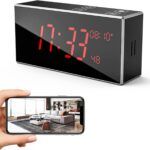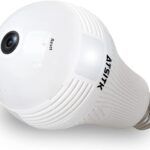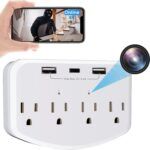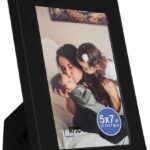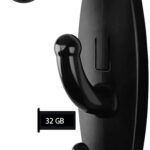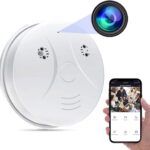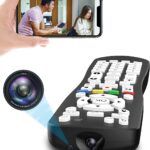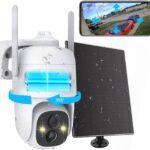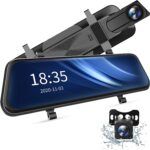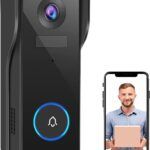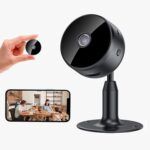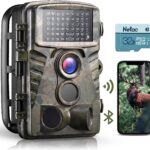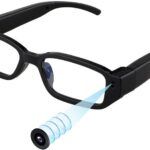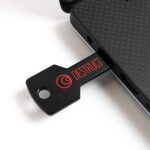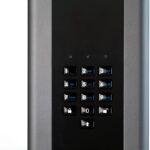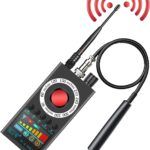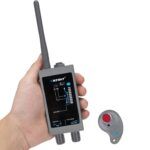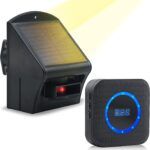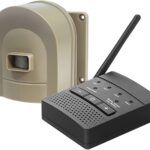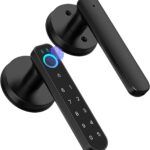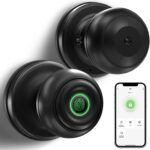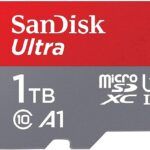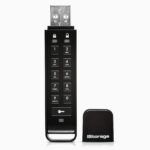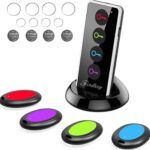- How do hidden audio recorders work?
Hidden voice recorders are designed to capture audio without detection. They work by recording audio in a discreet manner, usually in the form of a small device that can be hidden or disguised. These recorders may have features like voice activation or noise reduction to ensure high-quality audio capture. They may also have built-in storage or the ability to store audio on a separate device like an SD card. Hidden audio recorders can be powered by batteries or USB cables, depending on the device. Some recorders also have wireless capabilities and can be accessed remotely through a smartphone app or computer. Overall, these devices work by providing a covert means of audio recording for a variety of applications.
- Are hidden voice recorders legal?
The legality of hidden voice recorders varies by jurisdiction and intended use. In some cases, it may be legal to record a conversation without the other party’s consent if you are a participant in the conversation. However, in other cases, it may be illegal to record a conversation without the consent of all parties involved. It is important to research the laws in your jurisdiction and consult with an attorney before using a hidden voice recorder.
Additionally, it is important to consider ethical considerations when using a hidden voice recorder. Using a hidden voice recorder to record conversations without the other party’s knowledge or consent can be seen as a violation of privacy and trust. It is important to consider the potential consequences and impact on relationships before using a hidden audio recorder.
- What are the benefits of using a hidden audio recorder?
Audio recorders have a wide range of benefits, including personal and professional uses. One of the main advantages of using a hidden voice recorder is its ability to capture conversations discreetly and without the knowledge of others. This can be useful for recording important business meetings, interviews, or even for personal use, such as recording a lecture or a conversation with a healthcare provider for reference later on. Additionally, hidden audio recorders can be used as a tool for self-protection or as evidence in legal disputes.
Another benefit of using a hidden recorder is its portability and ease of use. Many audio recorders are small and can easily fit in a pocket, making them ideal for recording on the go. Some models also offer extended battery life, allowing for longer recording times without the need for frequent recharging. These discreet voice recorders can be a valuable tool for both personal and professional use, providing a convenient and discreet way to capture important conversations and events.
- How can I hide a voice recorder?
Hiding a voice recorder depends on the situation and the object that you intend to use. A voice recorder can be hidden in various places, such as inside a pen, a USB drive, a watch, a keychain, or even a phone charger. Some voice recorders are designed to be discreet, such as those that are small and compact, while others can be disguised as everyday objects, such as a car key or a water bottle.
The key is to find a hiding spot that is inconspicuous and blends in with the surrounding environment.
- What is the battery life of a hidden voice recorder?
The battery life of a hidden voice recorder varies depending on the model, the quality of the recording, and the amount of time it is used. Some models may have a battery life of several days or even weeks, while others may only last a few hours. It is important to carefully read the manufacturer’s specifications and reviews to determine the battery life of the hidden voice recorder you are considering.
It is also important to note that the battery life can be affected by various factors, such as the temperature, the quality of the batteries used, and the recording mode. Additionally, some hidden voice recorders come with features like voice activation, which can extend the battery life by only recording when there is sound detected.
- How much storage does a hidden audio recorder have?
The amount of storage an audio recorder has can vary depending on the model and brand. Some may have built-in storage with a capacity of a few gigabytes, while others may have expandable memory options with the use of a micro SD card. The recording quality and format can also affect the amount of storage required.
Assuming an average bit rate of 128 kbps (kilobits per second) for MP3 files, a 32GB SD card can store approximately 320 hours of audio. However, if the MP3 files are encoded at a higher bit rate, such as 320 kbps, the storage capacity will be reduced accordingly. Conversely, if the files are encoded at a lower bit rate, such as 64 kbps, the storage capacity will increase.
It’s essential to check the storage capacity and recording format before purchasing a hidden recorder to ensure it meets your recording needs. Additionally, it’s crucial to transfer the recordings to a secure location regularly to prevent storage from running out and losing important data.
- How can I transfer recordings from a voice recorder to my computer?
Most hidden voice recorders come with a USB cable or an SD card, which allows you to transfer recordings to your computer. You simply need to connect the recorder to your computer using the USB cable, or insert the SD card into your computer, and then copy the files to your hard drive. Some sound recorders may also come with software that you can install on your computer to make the transfer process easier.
It’s important to note that some voice recorders may require specific software or drivers to be installed on your computer before they can be recognized and accessed. Additionally, some recorders may have security measures in place to prevent unauthorized access to the recordings, so be sure to follow the manufacturer’s instructions when transferring recordings to your computer.
- Can hidden audio recorders be detected?
The effectiveness of detecting hidden audio recorders depends on the type of device and the method used for detection. There are various techniques and tools available for detecting hidden audio recorders, such as radio frequency (RF) detectors, non-linear junction detectors, and infrared cameras. However, the use of some detection methods may not be 100% accurate as the technology behind audio recorders is constantly evolving.
 BTFDREEM Hidden Devices Detector - Find Bugs, Cameras & Trackers$69.89
BTFDREEM Hidden Devices Detector - Find Bugs, Cameras & Trackers$69.89 Knight KT9000 Premium Hidden Devices Detector$129.99
Knight KT9000 Premium Hidden Devices Detector$129.99It is also important to note that in some cases, the size and design of the hidden audio recorder may make it difficult to detect. In addition, recorders which don’t emit any signal may not be detected by most audio or video detection devices.
Never forget that using hidden audio recorders for illegal purposes, such as espionage or blackmail, can result in severe legal consequences.
- Can I use a hidden voice recorder for interviews or meetings?
Using a hidden voice recorder can be a convenient way to record interviews or meetings, especially when taking notes is not possible or impractical. With a hidden audio recorder, you can record the conversation without interrupting it, and later transcribe the audio for further analysis. However, it is important to keep in mind that recording a conversation without the knowledge or consent of all parties involved may be illegal in some jurisdictions. Therefore, it is advisable to check the local laws and regulations before using a hidden sound recorder for interviews or meetings.
If you decide to use a voice recorder for job interviews or meetings, it is important to make sure that the recorder is discreetly hidden and placed in a location that can capture clear audio without being detected. You may also want to use a recorder that has noise reduction and amplification features to ensure that the recorded audio is of good quality. It is also advisable to test the recorder before the interview or meeting to make sure that it is working properly and to adjust the settings as needed.
- Can I use a hidden voice recorder to record phone conversations?
Assuming the use of a hidden voice recorder is legal, you can use it to record phone conversations. However, doing so may require additional equipment or software, as most phone conversations occur over a cellular network or a landline. Unless you’re using a speakerphone, recording a phone conversation requires the use of an external microphone or an adapter to connect the recorder directly to the phone line. Additionally, it is important to ensure that the recording quality is sufficient, and the recording device is hidden from the other party’s view during video calls, as they may object to being recorded.
Using hidden voice recorders is a smart way to ensure an accurate record of conversations and transactions. By recording audio secretly, you can protect yourself from fraudulent or deceitful behavior, and have evidence in case of any dispute. Hidden voice recorders are especially useful for business negotiations, legal proceedings, and personal interactions where you need to keep track of important details.
Showing all 20 products:

Akaluli Hidden Pen Voice Recorder
$43.99
Ashata Audio Recording Jammer
$138.09
Atsitk Light Bulb Hidden Camera
$29.99
Clodgdlo Car Key Hidden Spy Camera & Microphone
$39.99
Fun&H Dice Mini Spy Camera
$6.53
Funscam Water Bottle Wifi Spy Cam
$59.99-
Sale!

Iznvee WiFi Repeater Hidden Camera
$59.99 
Knight Magnetic Voice Activated Recorder
$59.80
Miuyogern Alarm Clock Hidden Spy Camera
$39.99
OhO 4K Sunglasses Spy Camera
$168.99
Oucam Small WiFi Spy Camera
$17.99-
Sale!

Outsmart Gadgets Pen Voice Recorder
$39.99 
PBN-TEC K-MIC Voice Activated Recorder
$119.99
STTWUNAKE Necklace Voice Recorder
$39.80
STTWUNAKE Small Magnetic Voice Activated Recorder
$68.00
Taheng USB Drive Voice Activated Recorder
$39.88
TCTEC Keychain Voice Recorder
$55.99
TileRec Slim Voice Recorder
$72.90
Union WiFi Mini Spy Nanny Cam
$28.99
Wolfbox WiFi Dash Camera (Front & Rear)
$199.99

Hidden voice recorders, also known as hidden audio recorders, are small devices used to record conversations and other sounds without being detected. They are often used for personal or professional purposes, such as recording meetings, lectures, or interviews. Hidden voice recorders come in various forms, including USB flash drives, pens, wristwatches, and even keychains.
One of the benefits of using a hidden voice recorder is the ability to capture important information without drawing attention to oneself. This can be particularly useful in situations where a person needs to gather evidence or information discreetly, such as in a legal or investigative context. Hidden voice recorders can also be helpful for personal use, such as recording memories or conversations with loved ones.
See also: Hidden Cameras with Audio Recording
However, it is important to note that the use of hidden voice recording devices can raise ethical and legal concerns, especially when used without the consent of all parties involved in a conversation. In many jurisdictions, recording conversations without consent is illegal and can result in serious consequences. As such, it is important to research the laws and regulations in your jurisdiction before using a hidden voice recorder. Additionally, it is important to consider the potential consequences of using a hidden voice recorder and to use it in a responsible and ethical manner.
Voice Recording FAQs
Need both audio & video? Consider these hidden cameras with voice recording:
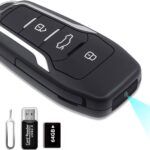 $39.99
$39.99Clodgdlo Car Key Hidden Spy Camera is the perfect blend of functionality and covert surveillance. This compact and discreet device looks jus...
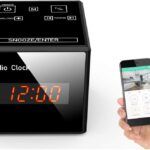 $109.99
$109.99Forthaus FM Radio Hidden Spy Camera functions as an HD 1080P cube covert camera, an alarm clock, an FM radio, a Bluetooth wireless speaker, ...
 $74.99
$74.99Introducing the Hereta Spy Camera Glasses, a revolutionary product that combines video recording and picture taking with fashionable eyewear...
 $89.99
$89.99Miuyogern WiFi Phone Charger Hidden Camera is a cutting-edge 3-in-1 device that combines a hidden camera, wireless phone charger, and mobile...
Hidden voice recording devices have become increasingly popular due to their convenience and discreetness. They offer numerous benefits such as providing evidence, capturing important conversations and interviews, and ensuring security. However, it is important to note that the use of hidden voice recorders can have legal and ethical implications. It is vital to ensure that they are used in a legal and ethical manner to avoid legal consequences.
Before purchasing or using a hidden voice recorder, it is crucial to understand the laws and regulations in your area regarding their use. It is also important to consider the recording quality, battery life, and storage capacity of the device to ensure that it meets your specific needs. Overall, while hidden voice recorders have their benefits, it is essential to use them responsibly and legally to avoid any legal or ethical issues.

